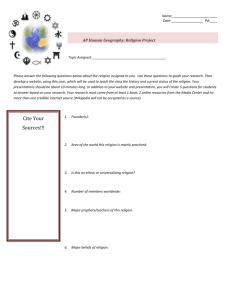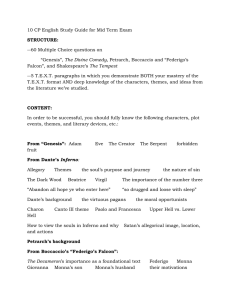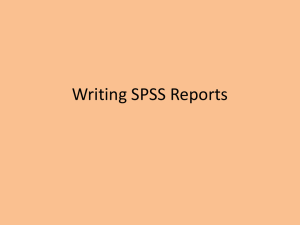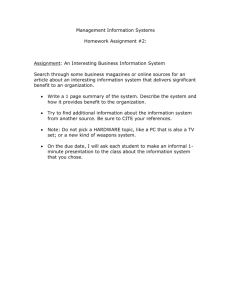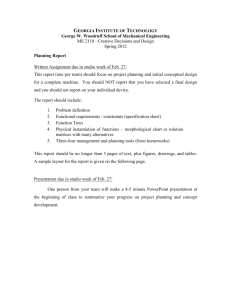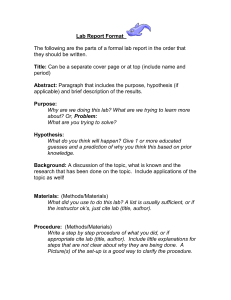Federigo's Falcon by Giovanni Boccaccio: Reader's Guide. Read
advertisement
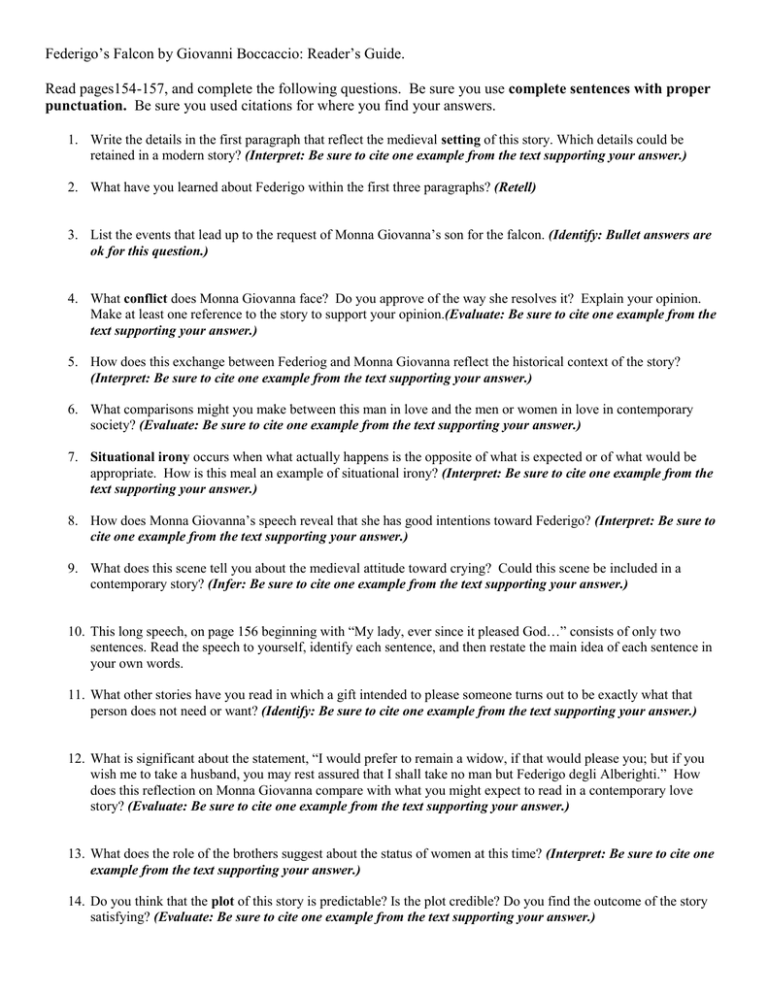
Federigo’s Falcon by Giovanni Boccaccio: Reader’s Guide. Read pages154-157, and complete the following questions. Be sure you use complete sentences with proper punctuation. Be sure you used citations for where you find your answers. 1. Write the details in the first paragraph that reflect the medieval setting of this story. Which details could be retained in a modern story? (Interpret: Be sure to cite one example from the text supporting your answer.) 2. What have you learned about Federigo within the first three paragraphs? (Retell) 3. List the events that lead up to the request of Monna Giovanna’s son for the falcon. (Identify: Bullet answers are ok for this question.) 4. What conflict does Monna Giovanna face? Do you approve of the way she resolves it? Explain your opinion. Make at least one reference to the story to support your opinion.(Evaluate: Be sure to cite one example from the text supporting your answer.) 5. How does this exchange between Federiog and Monna Giovanna reflect the historical context of the story? (Interpret: Be sure to cite one example from the text supporting your answer.) 6. What comparisons might you make between this man in love and the men or women in love in contemporary society? (Evaluate: Be sure to cite one example from the text supporting your answer.) 7. Situational irony occurs when what actually happens is the opposite of what is expected or of what would be appropriate. How is this meal an example of situational irony? (Interpret: Be sure to cite one example from the text supporting your answer.) 8. How does Monna Giovanna’s speech reveal that she has good intentions toward Federigo? (Interpret: Be sure to cite one example from the text supporting your answer.) 9. What does this scene tell you about the medieval attitude toward crying? Could this scene be included in a contemporary story? (Infer: Be sure to cite one example from the text supporting your answer.) 10. This long speech, on page 156 beginning with “My lady, ever since it pleased God…” consists of only two sentences. Read the speech to yourself, identify each sentence, and then restate the main idea of each sentence in your own words. 11. What other stories have you read in which a gift intended to please someone turns out to be exactly what that person does not need or want? (Identify: Be sure to cite one example from the text supporting your answer.) 12. What is significant about the statement, “I would prefer to remain a widow, if that would please you; but if you wish me to take a husband, you may rest assured that I shall take no man but Federigo degli Alberighti.” How does this reflection on Monna Giovanna compare with what you might expect to read in a contemporary love story? (Evaluate: Be sure to cite one example from the text supporting your answer.) 13. What does the role of the brothers suggest about the status of women at this time? (Interpret: Be sure to cite one example from the text supporting your answer.) 14. Do you think that the plot of this story is predictable? Is the plot credible? Do you find the outcome of the story satisfying? (Evaluate: Be sure to cite one example from the text supporting your answer.) Federigo’s Falcon by Giovanni Boccaccio: Reader’s Guide. Read pages154-157, and complete the following questions. Be sure you use complete sentences with proper punctuation. Be sure you used citations for where you find your answers. 1. Write the details in the first paragraph that reflect the medieval setting of this story. Which details could be retained in a modern story? (Interpret: Be sure to cite one example from the text supporting your answer.) 2. What have you learned about Federigo within the first three paragraphs? (Retell) 3. List the events that lead up to the request of Monna Giovanna’s son for the falcon. (Identify: Bullet answers are ok for this question.) 4. What conflict does Monna Giovanna face? Do you approve of the way she resolves it? Explain your opinion. Make at least one reference to the story to support your opinion.(Evaluate: Be sure to cite one example from the text supporting your answer.) 5. How does this exchange between Federiog and Monna Giovanna reflect the historical context of the story? (Interpret: Be sure to cite one example from the text supporting your answer.) 6. What comparisons might you make between this man in love and the men or women in love in contemporary society? (Evaluate: Be sure to cite one example from the text supporting your answer.) 7. Situational irony occurs when what actually happens is the opposite of what is expected or of what would be appropriate. How is this meal an example of situational irony? (Interpret: Be sure to cite one example from the text supporting your answer.) 8. How does Monna Giovanna’s speech reveal that she has good intentions toward Federigo? (Interpret: Be sure to cite one example from the text supporting your answer.) 9. What does this scene tell you about the medieval attitude toward crying? Could this scene be included in a contemporary story? (Infer: Be sure to cite one example from the text supporting your answer.) 10. This long speech, on page 156 beginning with “My lady, ever since it pleased God…” consists of only two sentences. Read the speech to yourself, identify each sentence, and then restate the main idea of each sentence in your own words. 11. What other stories have you read in which a gift intended to please someone turns out to be exactly what that person does not need or want? (Identify: Be sure to cite one example from the text supporting your answer.) 12. What is significant about the statement, “I would prefer to remain a widow, if that would please you; but if you wish me to take a husband, you may rest assured that I shall take no man but Federigo degli Alberighti.” How does this reflection on Monna Giovanna compare with what you might expect to read in a contemporary love story? (Evaluate: Be sure to cite one example from the text supporting your answer.) 13. What does the role of the brothers suggest about the status of women at this time? (Interpret: Be sure to cite one example from the text supporting your answer.) 14. Do you think that the plot of this story is predictable? Is the plot credible? Do you find the outcome of the story satisfying? (Evaluate: Be sure to cite one example from the text supporting your answer.)
